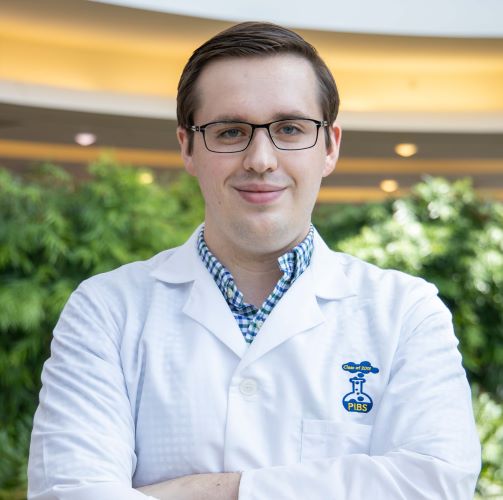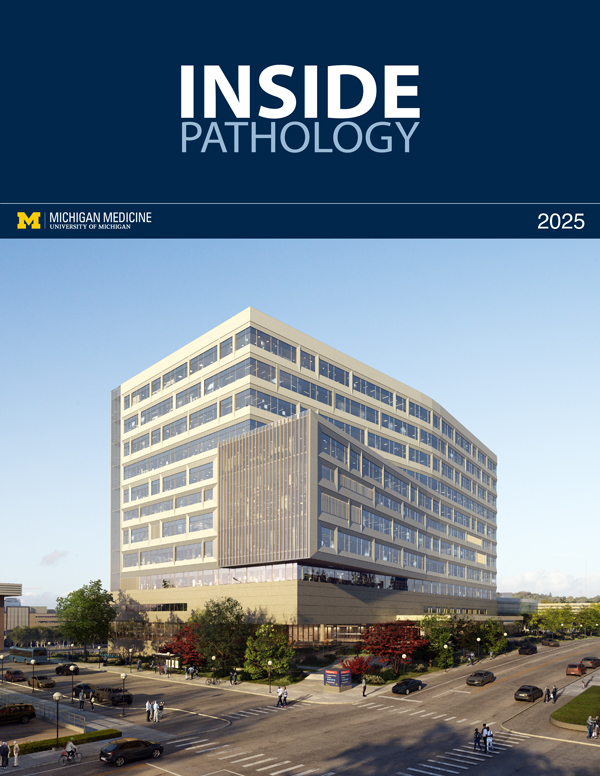Alec Monovich becomes Dr. Alexander C. Monovich
By Lynn McCain | June 30 2025 In August 2018, Alexander (Alec) Monovich began a journey that culminated in the successful defense of his doctoral thesis on April 15, 2025. Monovich, who was raised in Naperville, Illinois, joined the Program in Biological Sciences (PIBS) graduate program immediately following his graduation from Grinnell College in Grinnell, Iowa, with a B.A. in Biology. After an exploratory year, Monovich joined the Molecular and Cellular Pathology Graduate Program and later completed his dissertation work in the laboratory of Dr. Russell Ryan, assistant professor of pathology.
In August 2018, Alexander (Alec) Monovich began a journey that culminated in the successful defense of his doctoral thesis on April 15, 2025. Monovich, who was raised in Naperville, Illinois, joined the Program in Biological Sciences (PIBS) graduate program immediately following his graduation from Grinnell College in Grinnell, Iowa, with a B.A. in Biology. After an exploratory year, Monovich joined the Molecular and Cellular Pathology Graduate Program and later completed his dissertation work in the laboratory of Dr. Russell Ryan, assistant professor of pathology.
“I’ve had a lifelong love for biology and the natural world, whether it was looking for birds with my birder father, identifying animals from tracks as a Boy Scout, or digging for dinosaur fossils with a paleontologist, I was always out learning about life on this planet. It was logical for me to pursue a career in science,” explained Monovich. High school biology was a turning point for him, and he knew that he wanted to pursue biological sciences. He explored different types of biological sciences in college and experienced some impactful research internships that provided him with direction for the future. One summer, he interned at Novartis in Cambridge, Massachusetts, where he worked on identifying bacterial natural product producers. Later, he had a second internship at DuPont Pioneer (now Corteva) in Johnston, Iowa, where he worked to identify and characterize novel CRISPR-Cas9 systems. “These experiences introduced me to Next Generation Sequencing (NGS) technologies and their importance in answering complex biological questions.”
As his undergraduate program was wrapping up, Monovich began exploring possible graduate programs to pursue a PhD. “I wanted to apply NGS to the study of human pathology. Given the research and resource offerings at Michigan, PIBS, and our Pathology department, Michigan seemed like a great fit. The opportunity to pursue a concurrent master’s degree in bioinformatics while completing my PhD was also a big draw, as it allowed me to really become a whole-process scientist when it comes to working with NGS in that I could both generate data at the bench and perform the necessary analysis to interpret my results.”
In the lab of Dr. Russell Ryan, Monovich began his work to better understand the role of GGAA microsatellite enhancers in B-cell Acute Lymphoblastic Leukemia (B-ALL). He focused his research primarily on a pediatric B-ALL subtype, ETV6::RUNX1 rearranged B-ALL, that involves alteration of the ETS family transcriptional repressor ETV6. “In cancer, gene enhancers are activated abnormally downstream of cancer-specific genomic perturbations to initiate and sustain oncogenic gene-expression programs, so understanding how enhancer activity is aberrantly altered in cancer may open new ways of specifically targeting cancer cells.” He began to investigate how the ETV6::RUNX1 rearrangement and loss of ETV6 activity impacted the enhancer landscape of ETV6::RUNX1+ B-ALL. “This rearrangement is the most common recurrent chromosomal rearrangement in pediatric B-ALL and leads to fusion of the ETV6 and RUNX1 genes and expression of the ETV6::RUNX1 oncofusion protein.” He with his co-authors found that in B-ALL cells that did not express normal ETV6 as a consequence of this rearrangement and other alterations, GGAA microsatellites aberrantly took on enhancer-like activities to drive signature gene expression. He also found that in the absence of the usual repressive ETV6 binding at these microsatellite sites, the transcriptional activator ERG strongly binds to GGAA microsatellite enhancers to drive their activity, which may promote the development of B-ALL through the expression of known oncogenes like EPOR. This collaborative work was published in Blood Cancer Discovery in 2023.
 Monovich has since been carrying out follow up work aimed at further characterizing the importance of these GGAA repeat enhancers in B-ALL. He has gone on to identify specific GGAA repeat enhancer and target oncogene relationships that appear to contribute to the reported fitness benefit of ETV6 inactivation in ETV6::RUNX1+ B-ALL utilizing high-throughput CRISPR-interference screening of putative GGAA repeat enhancer elements. He additionally has worked to perform extensive chromatin profiling of dozens of primary patient samples belonging the related ETV6::RUNX1-like subtype of B-ALL and others to assess whether GGAA repeat enhancers also play a role in this rare ETV6 altered pediatric disease. Monovich is looking forward to the publication of this work, which is being finished up by Monovich, members of the Ryan lab, and other collaborators.
Monovich has since been carrying out follow up work aimed at further characterizing the importance of these GGAA repeat enhancers in B-ALL. He has gone on to identify specific GGAA repeat enhancer and target oncogene relationships that appear to contribute to the reported fitness benefit of ETV6 inactivation in ETV6::RUNX1+ B-ALL utilizing high-throughput CRISPR-interference screening of putative GGAA repeat enhancer elements. He additionally has worked to perform extensive chromatin profiling of dozens of primary patient samples belonging the related ETV6::RUNX1-like subtype of B-ALL and others to assess whether GGAA repeat enhancers also play a role in this rare ETV6 altered pediatric disease. Monovich is looking forward to the publication of this work, which is being finished up by Monovich, members of the Ryan lab, and other collaborators.
Now that he has graduated Monovich is working as a Development Scientist at New England Biolabs (NEB) in their Next Generation Sequencing division (NEBNext) where he is working to develop products that assist researchers in answering important questions that hopefully lead to new ways to treat human disease. He is enjoying his new life in Boston’s North Shore near the Atlantic Ocean, exploring New England, finding new bird species, and going to the beach.
Congratulations, Alec, on earning your PhD and MS degrees! We wish you the best as you pursue your dreams.
****
Citation: Kodgule R, Goldman JW, Monovich AC, Saari T, Aguilar AR, Hall CN, Rajesh N, Gupta J, Chu SA, Ye L, Gurumurthy A, Iyer A, Brown NA, Chiang MY, Cieslik MP, Ryan RJH. ETV6 Deficiency Unlocks ERG-Dependent Microsatellite Enhancers to Drive Aberrant Gene Activation in B-Lymphoblastic Leukemia. Blood Cancer Discov. 2023 Jan 6;4(1):34-53. doi: 10.1158/2643-3230.BCD-21-0224. PMID: 36350827; PMCID: PMC9820540.
 ON THE COVER
ON THE COVER
 ON THE COVER
ON THE COVER
 ON THE COVER
ON THE COVER
 ON THE COVER
ON THE COVER
 ON THE COVER
ON THE COVER
 ON THE COVER
ON THE COVER
 ON THE COVER
ON THE COVER
 ON THE COVER
ON THE COVER
 ON THE COVER
ON THE COVER
 ON THE COVER
ON THE COVER
 ON THE COVER
ON THE COVER
